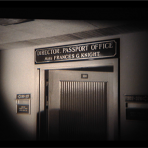Ugly Americans v. Passport Ogress: Cold War travel policy and the US Passport Office
Ugly Americans v. Passport Ogress: Cold War travel policy and the US Passport Office
Categories: Lectures and Seminars | Intended for Anyone

A602 Loeb Building
1125 Colonel By Dr, Ottawa, ON
Contact Information
Anne Farquharson, 2777, anne.farquharson@carletonc.a
Registration
No registration required.
Cost
Free
About this Event
Host Organization: Dept of Political Science
More Information: Please click here for additional details.
Political Science Speaker Series Event
Catriona Gold, University College London
In the years immediately following WWII, the travelling American emerged as a hotly-debated domestic and foreign policy concern. Some policymakers sought to consolidate the US’ economic and cultural might by producing and facilitating the travel of ‘desirable’ Americans, e.g. in connection with the Marshall Plan; others were most concerned with curtailing the travel of Americans deemed ‘subversive’. Both approaches came to intersect in the US Passport Office, which during the 1950s and 60s underwent an unprecedented expansion under the controversial directorship of Frances Knight (1955-1977). Drawing upon detailed archival research at the Library of Congress and the US National Archives, this presentation charts how the Passport Office under Knight rose from relative obscurity to become a central arena for — and actor in — these debates, ultimately exerting profound influence on the development of US travel policy and travel itself.
Catriona Gold is a PhD candidate at University College London and a Visiting Scholar at Carleton’s Political Science department. Her current research concerns shifting policy approaches to American citizens’ travel during the Cold War, with a particular focus on the US Passport Office. She is a political geographer and mobility scholar by training, with previous degrees from the University of British Columbia, University College London, and the University of Nottingham. Catriona’s current research and her visit to Carleton are funded by the UK’s Economic and Social Research Council; her PhD fieldwork in Washington DC was facilitated by a six-month fellowship at the Library of Congress, funded by the Arts and Humanities Research Council.